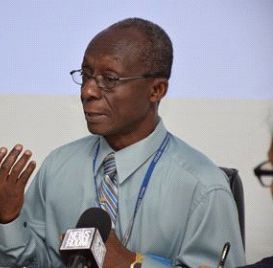Guyana has so far handled the novel coronavirus disease (COVID-19) pandemic fairly well as the emergency measures put in place worked to decrease the spread, according to Pan American Health Organization (PAHO) representative Dr. William Adu-Krow.
The PAHO representative revealed to Stabroek News on Monday that emergency measures, inclusive of the closure of the air and seaports, has decreased the number of cases that could have been imported into the country even as new projections show that there could be a large increase in cases if these measures are to be removed. “In most countries, there is a sudden rise and then a sudden drop. In our case, there hasn’t been that sudden rise but it is gradually increasing. Even though the curfew has worked, it has not cut off the transmission,” the PAHO representative said.
“If we opened up immediately and assume that we will get one case from the airport every day, we are likely to have by July 15th, 10,000 cases,” Dr. Adu-Krow said when asked about the most recent projections done by PAHO. He further added if the measures are to be gradually phased out, that number would be lowered to approximately 7,354.
The representative further noted that based on their projections, if the curfew and other measures are extended for another two weeks beyond the June 3rd expiration date and a phased approach to fully reopening is initiated, there could be 617 cases. (The government has since announced that the current COVID-19 emergency measures will be extended until June 17th, 2020.)
“Instead of June 3rd… June 17th start a phased approach, that number gets to about 617, which is more manageable,” Dr. Adu-Krow said, while adding that if curfew measures are lifted Guyana could possibly see 1,110 persons being hospitalised with the virus based on further projections.
He highlighted that there is still a large number of persons who are not obeying the curfew and are still having parties in their homes as well as persons who are not essential workers being out of their homes when there is no need to be. “If we are able to tighten a little bit more, the curfew and the measures that have been put in place and enforce them… the critical word is enforcement, if we’re able to enforce that I think we will have that drop,” he noted.
Dr. Adu-Krow noted that PAHO would support whatever decision is made by the authorities. He said that if the government chooses to do a phased approach, the authorities would still have to ensure that members of the public wear their masks, practice social distancing and continue to sanitise regularly. Any cases that come with that phased approach, he said, the public health system may be able to handle.
Dr. Adu-Krow also said that with the way Guyana is currently handling COVID-19, there may be no need for a total lockdown of the country even as the government recently announced that they are not looking at the option of having a total lockdown. “If we stay on course we should continue to have a good handle on the disease,” he said, while adding that Guyana is handling the outbreak well so far, inclusive of the testing rate.
Meanwhile, the PAHO representative noted that authorities are trying as it relates to effective contact tracing. He said that as the country’s case count currently stands at 153, the effective reproductive rate stands at 1.4, meaning that there is a possibility that those confirmed with the virus could have infected almost one and a half persons. “For every 100 suspected cases that you get, 20 will become positive globally, that means for every one person we’re doing contact tracing to about 7 to 10 people” he said. He went on to say that the health authorities have involved community health workers and even volunteers to assist with contact tracing.
Additionally, Dr. Adu-Krow mentioned that Guyana is part of the solidarity trial, which according to the World Health Organization (WHO) is an international clinical trial to help find an effective treatment for COVID-19. According to the WHO, the trial will compare four treatment options against “standard of care” to assess their effectiveness against COVID-19. The trial aims to rapidly discover whether any of the drugs slow disease progression or improve survival. Further Dr. Adu-Krow noted that Guyana, however, is not a part of any of the vaccination trials, four of which are ongoing in China, three in the United States and one in the United Kingdom.





